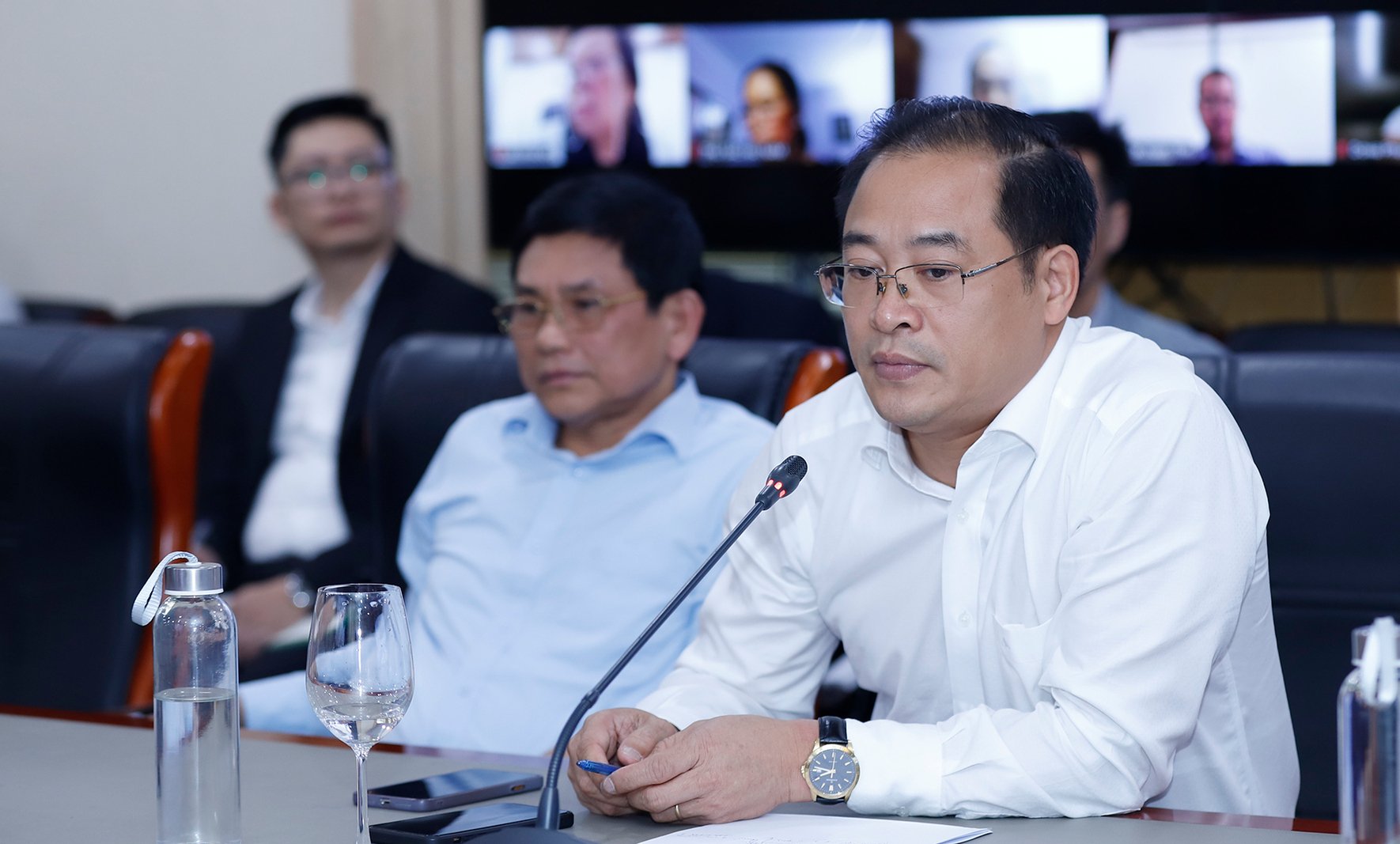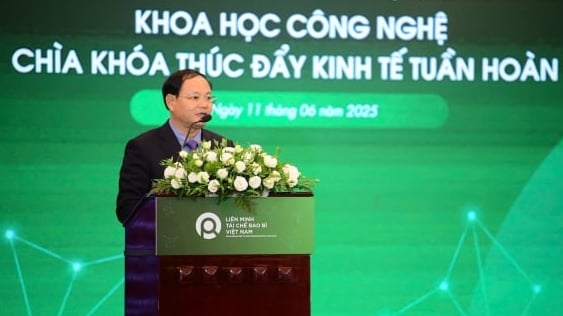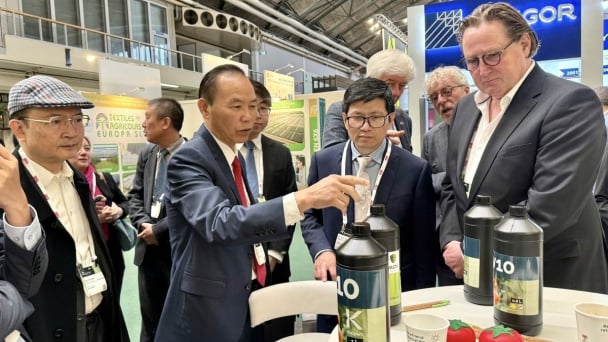June 14, 2025 | 02:44 GMT +7
June 14, 2025 | 02:44 GMT +7
Hotline: 0913.378.918
June 14, 2025 | 02:44 GMT +7
Hotline: 0913.378.918

Mr. Nguyen Hoai Nam (far right), Deputy General Secretary of the Vietnam Association of Seafood Exporters and Producers (VASEP), shares his views on tax negotiations with the United States. Photo: Khuong Trung.
At a meeting with Minister of Agriculture and Environment Do Duc Duy on the afternoon of April 7, Mr. Nguyen Hoai Nam, Deputy General Secretary of the Vietnam Association of Seafood Exporters and Producers (VASEP), affirmed his strong confidence in the decisions of the Vietnamese Party and Government leadership regarding the U.S.’ announcement of a proposed 46% reciprocal tariff on Vietnamese seafood.
According to Mr. Nam, the US market is significant to Vietnam’s seafood industry, accounting for a large market share, involving over 400 enterprises, employing labor from 40 provinces and cities, and attracting substantial investment.
“If a 46% reciprocal tariff is imposed, the Vietnamese seafood industry will face great difficulty competing in the US market. This would create pressures on social welfare within the country,” Mr. Nguyen Hoai Nam emphasized. He expressed his hope that measures for postponement, delay, and negotiation with the US on the implementation of this tariff would be considered.
The VASEP representative suggested that, if negotiations are possible, they should not be conducted on a general level, but rather separately for each sector and product line when engaging with the US side.
In terms of arguments, Mr. Nam believed that the US could be persuaded by highlighting the fact that Vietnam imports large quantities of American agricultural products to serve its domestic agricultural production, for example, soybeans and soybean meal for animal feed.
“This information can demonstrate Vietnam’s interest in and priority given to US agricultural products,” Mr. Nam analyzed.
Additionally, Mr. Nam presented another argument: that Vietnam’s agricultural exports to the US are essential goods that are complementary, not in direct competition with US domestic production.
Moreover, the possibility of reducing tariffs on some US seafood items exported to Vietnam to 0% could also be offered as a bargaining point in negotiations. The VASEP Secretary General even expressed hope that the proposed 46% tariff, introduced during the Trump administration, could be negotiated down to 0%.
As a long-term solution, Mr. Nguyen Hoai Nam proposed possibilities such as signing a Free Trade Agreement (FTA) with the U.S., or inviting the US to rejoin the Comprehensive and Progressive Agreement for Trans-Pacific Partnership (CPTPP).
In terms of market diversification, Mr. Nam mentioned Brazil as a potential new market for products like shrimp and pangasius, especially following the recent visit of the Brazilian President to Vietnam.
Mr. Nam expressed his desire for the Ministry of Agriculture and Environment and relevant authorities to support seafood enterprises in accessing this market. In response, Minister Do Duc Duy affirmed that he and Deputy Minister Phung Duc Tien would work with the Association to promote market expansion in Brazil.
Regarding financial matters, Mr. Nam raised several concerns. On behalf of VASEP members, he requested a need for credit support, timely VAT refunds, and a clear confirmation that seafood products are categorized as processed goods, not preliminarily processed, in order to qualify for preferential corporate income tax rates.
Minister Do Duc Duy affirmed that he would present these issues during Government and National Assembly meetings, particularly the definition of seafood products, so that enterprises may enjoy corporate income tax incentives.
According to statistics from VASEP, approximately 37,500 tons of various seafood products are currently en route to the US, along with an additional 31,500 tons scheduled for export in April and May. Furthermore, export orders already signed for this year amount to 38,500 tons.
If U.S. customs enforces the new tariff starting April 9 for goods arriving after that date, all shipments currently in transit will be subject to a 46% tariff rate, compared to the previous rates of 0% or 5.5 - 7%.
For instance, a shipment of shrimp worth USD 500,000, which previously incurred a 5% tariff (USD 25,000), would now face a 46% tariff - equivalent to USD 230,000, representing an unexpected and massive increase of USD 205,000.
This would strip Vietnam's seafood industry of its competitive advantage, especially while seafood-exporting countries such as India (26%), Ecuador (10%), Indonesia (32%), and Thailand (36%) continue to benefit from significantly lower tariff rates.
Translated by Kieu Chi

(VAN) The Department of Agriculture in South Africa has announced the country’s first mass vaccination of poultry to prevent local birds from contracting avian influenza.

(VAN) Establishment of the Mekong Delta Regional Agricultural Linkage Center, aiming for a closed value chain, deep processing, trading platforms, and international market connectivity.

(VAN) Gia Lai province has recently recorded 460 rare species of animals and plants, contributing to forest conservation and biodiversity planning in the region.

(VAN) Ms. Caroline Beresford, New Zealand Ambassador to Vietnam, expressed confidence that agricultural cooperation between Vietnam and New Zealand will develop sustainably, be climate-resilient, and promote gender equality.

(VAN) Vietnam reaffirms its commitment to international cooperation in fostering sustainable and responsible fisheries while ensuring resilient livelihoods for small-scale fishing communities.

(VAN) More than just a technical solution, science and technology are gradually becoming a cornerstone in Vietnam’s journey toward building a circular economy.

(VAN) The Netherlands is ready to accompany Vietnam in building a green, circular, and sustainable agriculture sector that is resilient to climate change.